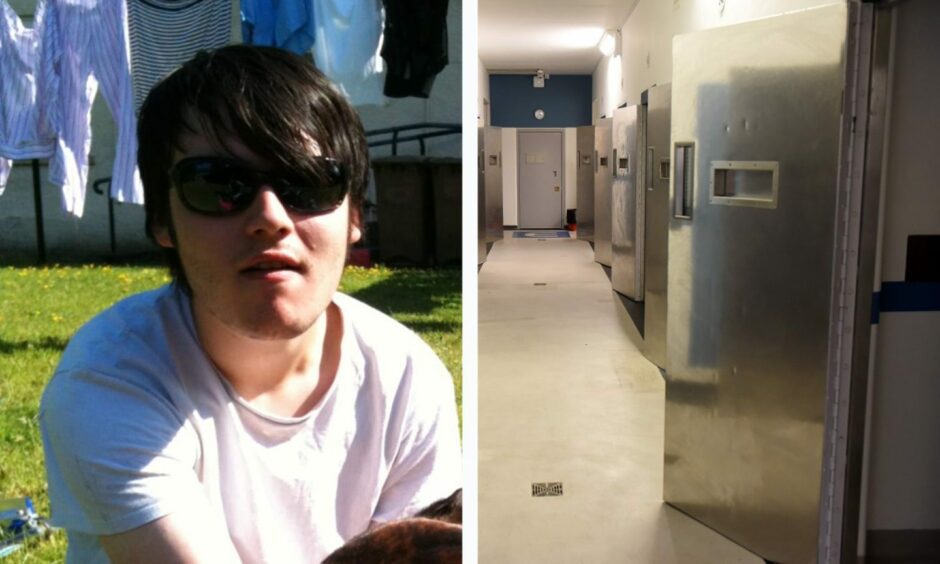An Aberdeen mum will come face-to-face with the boss of a controversial investigative unit that took around FIVE YEARS to probe her son’s police custody death back in June 2014.
Speaking exclusively to The Press and Journal before today’s showdown meeting, Sharon Fenty, 54, revealed she planned to demand explanations for the extreme delays.
She said they contributed toward an “agonising” decade-long wait for answers about her 20-year-old son Warren’s drug overdose death inside a Kittybrewster jail cell.
A shocking raft of failings over nearly 10 years caused a fatal accident inquiry (FAI) into the tragedy to become the longest of its kind in Scottish legal history.
Now, in a letter of apology to Mrs Fenty, Head of the Scottish Fatalities Investigations Unit (SFIU) Andy Shanks offered to meet the grieving mum to “hear about [her] experiences in this case”.
‘Only 22 months usefully spent’ by COPFS out of five years investigating Warren Fenty death, sheriff found
The senior official at the Crown Office and Procurator Fiscal Service (COPFS), which examines all sudden deaths, also said he wanted to “explain some of the improvements that have been made” to the SFIU and “further changes” still in the planning stages.
Crown officials only referred Warren Fenty’s case to the Scottish Courts and Tribunals Service (SCTS) in March 2020, almost six years after he lost his life.
A four-month-long independent probe by the police watchdog and the production of a post-mortem report was completed in just under a year.
However, as The P&J previously reported, a sheriff ruled that “only some 22 months were usefully spent” by the COPFS investigation out of approximately five years, while a three-year gap of inaction during that time “cannot be excused”.
It has still not been explained to Mrs Fenty.
Deadly methadone intoxication killed Warren Fenty, who was first a patient at Aberdeen Royal Infirmary before discharging himself against medical advice and being arrested by Police Scotland on suspicion of drug offences.
He was left alone in a cell and allowed to slip away while his suffering went unnoticed because “institutional failures” caused Police Scotland to miss opportunities to save his life.
It remains a mystery why Crown investigators only requested hospital and GP records and CCTV recordings in July 2018, followed by a seven-month gap before belatedly asking witnesses for their expert reports in February 2019.
‘How can I mend and move on without being told what went wrong and why?’
In his letter to Warren’s mother, Mr Shanks admitted: “It took too long to conclude our investigation and get the FAI into court and I am sorry for the impact this wait has had on you and your family.
“As a result of our experiences in this investigation, we have made a number of improvements in recent years designed to ensure that an investigation of this length does not occur again,” Mr Shanks explained.
But Mrs Fenty said his assurances were of no comfort to her because they made no difference to the horrific ordeal she had already suffered.
“The authorities are missing the point,” she said, explaining: “One of the most significant reasons for my ongoing grief is the harm that the long wait for answers and the hope of some justice has had on my mental health.
She went on: “How can I stand a chance at mending and moving on from this nightmare without being told exactly what went wrong during the Crown’s investigation and why, so I can try to understand it all?
“I will ask Mr Shanks what was behind the three-year delay at the start of the process.”
‘This doesn’t seem like an efficient or effective system of preventing death’
Mrs Fenty is being supported by the Scottish Centre for Crime and Justice Research (SCCJR) whose representative will accompany her at today’s meeting.
The SCCJR’s Professor Sarah Armstrong, a criminologist at the University of Glasgow, told The Press and Journal that a systemic change is urgently needed.
“Warren’s death is a devastating example of a fatal accident inquiry’s flaws. It took 10 years for a ruling to be made and in that time nearly 30 people have died in police custody across Scotland,” the professor claimed.
“This doesn’t seem like an efficient or effective system of preventing death,” she added.
The damning report published almost a decade after Mr Fenty passed away concluded that his death was “likely” avoidable but “no one individual can be held responsible.”
Two sheriffs, five missed deadlines, missing evidence and IT issues
However, in his extensive findings, Sheriff Principal Derek Pyle criticised a lack of patient information-sharing between those in contact with Mr Fenty, an inadequate examination by the newly opened custody suite’s in-house medic and welfare checks on the increasingly ailing detainee that failed to follow Police Scotland’s standard operating procedure.
Prof Armstrong said: “Despite the sheriff in this case finding significant institutional failures, the limits of the FAI system mean it cannot be a basis for holding individuals or agencies accountable.
“Warren’s family will find little comfort in this, and it is not clear how a process that does not trigger change and is this delayed serves the public interest or the larger cause of justice.”
Over 39 pages, the long-awaited determination summarised the evidence of 19 witnesses heard by Aberdeen Sheriff Court over 12 days.
However, it took two sheriffs a couple of years to publish the outcome of the hearings.
The original presiding Sheriff Morag McLaughlin was removed from her own inquiry after a “failure” to meet four publication deadlines due to “personal medical reasons.”
Then her replacement and boss, the sheriff principal left the country for “previously arranged leave abroad for three weeks” after missing a fifth deadline he set himself.
Missing evidence and IT issues with accessing the contents of a memory stick further added to the delays.
Mrs Fenty asked: “Did anyone at the Crown Office raise concerns about the delays under Sheriff McLaughlin, and if no one did, why not?
“That’s another question I’ll be asking Mr Shanks.”
Staffing at Kittybrewster custody suite has nearly doubled since Warren’s death and there is now a nurse on-site at all times according to the FAI’s determination.
Full summary of the Warren Fenty FAI findings:
- “The Police Scotland standard operating procedure for care of custodies should have had a procedure for the obtaining by police officers from hospital clinicians information on the nature of the medical condition, the treatment and any further precautions which should be taken post discharge where a person has been admitted into hospital prior to arrest into police custody;
- “The forensic medical examiner should have carried out a more thorough medical examination of Mr Fenty, which created a missed opportunity which if taken might have resulted in his re-admission into hospital and which would be likely to have avoided his death;
- “The custody officers should have conducted cell checks of Mr Fenty in accordance with the then standard operating procedure, which created a missed opportunity which might have resulted in them seeking the advice of the forensic medical examiner, which might in turn have resulted in Mr Fenty’s re-admission into hospital, which might have avoided his death.
- “Police Scotland should have had a system in place to ensure that the Kittybrewster custody centre opened with sufficient staff to cover all eventualities, including unexpected problems with new equipment, thereby allowing custody staff to perform their duties properly, including the passing on of information at shift changes and the recording of relevant information on the Cellfile computerised system.”
Read more:
- Police criticised as sheriff rules Aberdeen man’s death in custody ‘likely’ avoidable
- The many twists, turns and tears in Scotland’s longest-ever police custody death inquiry
- Aberdeen mum claims son’s police custody death inquiry fails to deliver closure or justice
- Comment – Justice system guilty of making Warren Fenty’s mother suffer for a decade
For all the latest court cases in Aberdeen as well as crime and breaking incidents, join our Facebook group.



